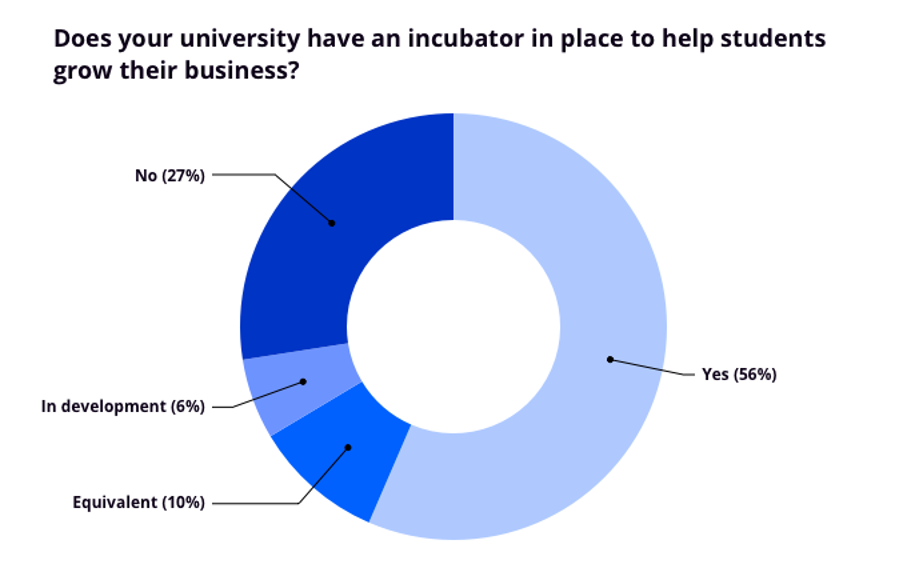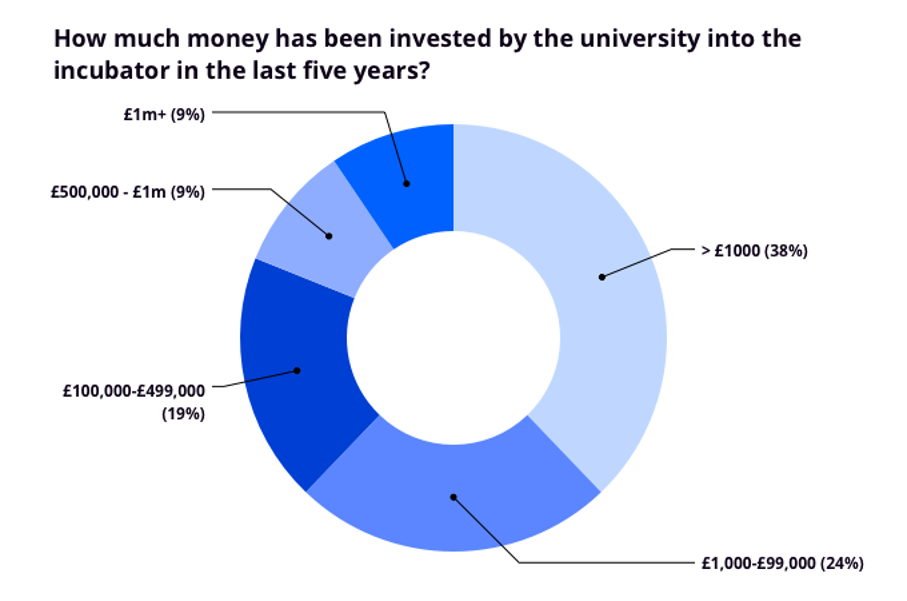
Are universities supporting the next generation of student startups?

Britain is one of the most entrepreneurial countries in Europe. From the sole market trader to cutting-edge tech startups, success stories can be found in every industry. Almost 1 in 10 UK adults have started their own business in the last three years, yet this is not reflected in graduate recruitment figures. Less than 5% of students identified as self-employed or freelance within six months of leaving university, and less than 1% had set up their own business.
Naturally, it takes a lot of ambition and commitment to manage your own enterprise. However, it raises an important question of whether universities do enough to support and inspire student entrepreneurs.
To find out, we asked every university in the UK using a Freedom of Information Act request about the facilities and services they offer students to support their aspirations of becoming entrepreneurs, or inspiring those who may want to consider it in future. Our research looked at three main areas of university expenditure:
- Incubator space for students to explore business ideas and collaborate with others
- Extra-curricular programmes to support aspiring entrepreneurs
- Business grants to help fund student-led initiatives
Overall, our research revealed a disjointed picture of funding and support across Britain’s universities, with Oxford and Cambridge having a natural advantage in talent and external funding. Though most institutions offer workshops to help students get inspired to become entrepreneurs, the support for them to start their own business is at university is missing.
Incubators
A university incubator is a space provided by the institution to support the development and growth of student-led businesses. This can be done by providing office space and/or meeting space, or helping students with community contacts who may further support a new business.
In an ideal world, universities would provide all three to inspire the next generation of businesses. Harvard University’s innovation lab provides over 30,000 square feet of open space and working areas, and a $100,000 startup accelerator program for alumni to compete for.
In the UK, Oxford’s University’s startup incubator remains the gold standard. It places itself at the heart of the city’s drive to become a British hub for tech innovation, and has received almost $2bn in investment to find the next ‘unicorn’ business.

Our research found that more than half of British universities offer some form of incubator space, and others, including the University of Liverpool, offer equivalent entrepreneurship centres more specifically for research-led ventures. The University of Sussex was the first to offer such support for businesses, launching in 1996.
However, we found that while many universities provide incubator facilities, many also fail to provide significant funding to support innovation. We found that nearly 40% of incubators have received less than £1,000 over the last five years and just 37% of colleges invest more than £100,000.

Where institutions choose to invest, they invest heavily. Seven universities put more than £1m into their incubators and one, the Royal Agricultural University has spent £5m on their facilities. With help from the EU’s common agricultural fund, their incubator aims to nurture the next generation of high-tech farming businesses.
Many universities point out that their facilities are self-funded and would argue that mere office space does not need continuous investment. However, what separates the elite institutions from the rest in this area is that they actively invest in student startups as well as giving them the space to develop.
Extra-Curricular Support
Our research found that universities were much more receptive to highlighting their extra-curricular support for business students. Though not all universities responded, many colleges said they offer mentoring schemes, networking events and non-degree classes and workshops to help inspire students to become entrepreneurs.
The University of Essex, for example, have offered more than 100 such schemes specifically related to entrepreneurship – the most of any institution. The University of Leeds have dedicated a section of their careers service to entrepreneurship, which offers advice, support and access to Leeds-run workshops and scholarships. The University of Glasgow run a ‘startup factory’ where teams of students pitch their business ideas to a panel of experts with the winner receiving £1000 in startup funding.
Grants
Our research also looked into the level of funding given to business and innovation grants by universities to benefit entrepreneurs. This also painted quite a disparaging picture, with almost half of institutions saying they don’t offer any grants to support enterprising students.

The University of Nottingham was the only place to offer more than £500,000 in grants over the last five years, thanks to their Ingenuity Programme. However, many of these universities, including Nottingham offer grants partly or entirely with external funding from local businesses, philanthropists and trusts.
A recent study called for greater continuity among universities for student schemes, questioning whether the current models work best for inspiring the next generation. Currently, student entrepreneur schemes vary depending on where you study.
Specialist institutions like the Royal Agricultural University have facilities in niche areas for businesses to form, but most mainstream universities simply do not offer the level of support for aspiring entrepreneurs compared to their equivalents at Oxford and Cambridge.
Moreover, these universities do not actively invest in student startups as much so cannot make as much in return when a student’s bright idea becomes commercially successful. Charity-led initiatives such as Young Enterprise highlight the talent young people have in all areas of the country to produce innovative ideas.
It is a great challenge to commit to starting your own company, but the fact still remains that less than 1% of students are leaving university to start their own enterprise. Having a good business idea is one thing, but it takes a lot of time, commitment and money to make that leap.
More universities should invest and more proactively support student entrepreneurs financially. That may mean taking risks and investing in their students’ brightest ideas, but it could further inspire more ambitious young startups to follow suit.
Photo by KML, published on Pexels


